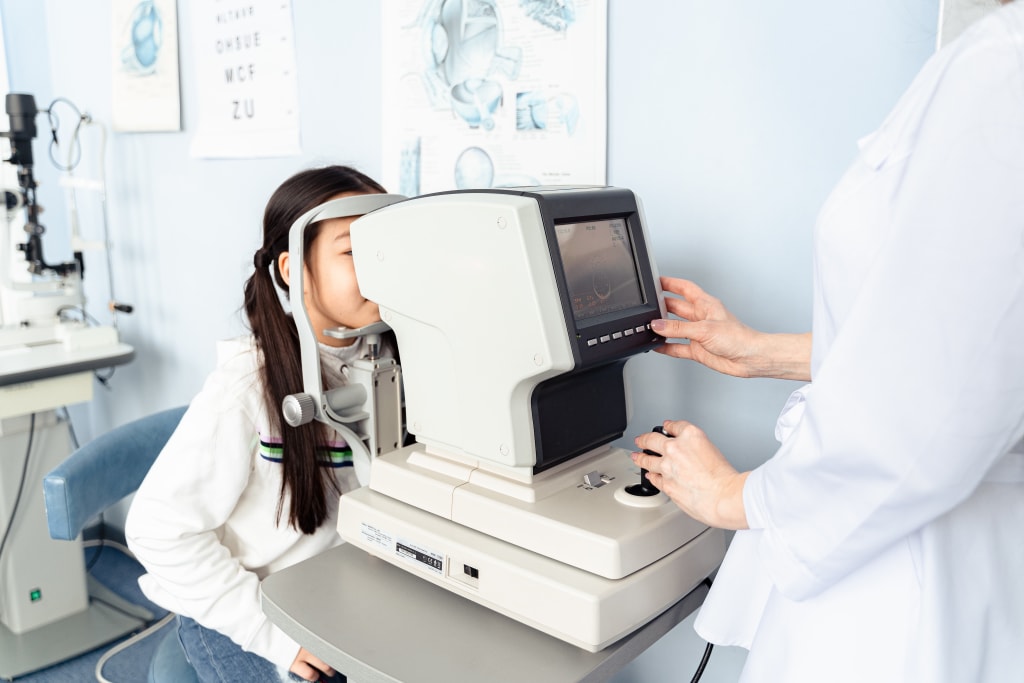Debunked: 7 Eye Myths That Aren't True
eye care

People often believe things about eye care that aren’t true. People may not take care of their eyes because they believe these myths, which can lead to serious vision problems. In this piece, we’ll bust seven false ideas about eye care.
The first is that if you sit too close to the TV, it will hurt your eyes. Even though sitting too close to the TV can make your eyes feel tired, it won’t hurt your eyes forever. The second myth is that your eyes will get hurt if you read in low light. Also, this is not true. Reading in low light can make your eyes feel tired and strained, but it won’t hurt your eyesight. The third lie is that glasses or contacts can make your vision worse. This is also not true. Putting on glasses or contacts can fix your vision and stop it from getting worse.
Myth: Reading in the Dark Damages Your Eyes
People often think that reading in the dark is bad for your eyes, but this is not true. Even though reading in low light can make your eyes tired and strained, it won’t hurt your eyes in any way that will last.
People probably think that reading in the dark can hurt your eyes because it can be harder to see in low light. When you try to see in low light, your eyes may feel tired or achy, and you may get headaches or blurry vision. But this is just a short-term problem that won’t hurt you in the long run.
In fact, your eyes are made to adjust to different light levels. When you’re in a dark place, your pupils get bigger to let more light in. This can help you see better in low light. Even though it may be harder to read in the dark, it won’t hurt your eyes.
Overall, it’s important to give your eyes a break and rest them often, especially if you read a lot or work on a computer for a long time. But you don’t have to worry that reading in the dark will hurt your eyes in the long run.
Myth: Carrots Can Improve Your Vision
People often think that carrots are good for your eyes and improve your vision. This story has been going around for a long time, but it’s not entirely true.
Carrots have a lot of Vitamin A, which is important for healthy eyes, but they can’t make your vision better than it already is. In other words, eating carrots won’t suddenly make your eyesight better if you don’t already have a problem with your eyesight.
The cornea, which is the clear top layer of the eye, needs vitamin A to stay healthy. But if you eat too much Vitamin A, it can hurt you and even make you sick. So, it’s important to limit how much Vitamin A you take in.
There are many things that are good for eye health besides carrots. These include leafy greens, fish, and citrus fruits. Other important nutrients, like Omega-3 fatty acids and Vitamin C, are found in these foods and can help keep your eyes healthy.
Carrots are a healthy food choice, but they can’t make your eyesight better than it already is. To keep your eyes healthy, you should eat well and see an eye doctor on a daily basis.

Other Eye Myths
There are several other eye myths that are not entirely true, such as:
Sitting too close to the TV can damage your eyesight
Reading in dim light can harm your eyes
Wearing glasses will make your eyesight worse
Rubbing your eyes can damage them
Staring at a computer screen for too long can damage your eyesight
While these myths may have some truth to them, they are often exaggerated or based on outdated information. It is important to consult an eye doctor for accurate information about eye health and to maintain good eye habits, such as taking breaks when staring at screens for extended periods of time
Myth: Staring at a Computer Screen Causes Permanent Eye Damage
Many people think that staring at a computer screen for long amounts of time can damage your eyes in a way that can’t be fixed. Even though staring at a screen for a long time can cause eye strain, it doesn’t hurt the eyes in a lasting way.
The American Academy of Ophthalmology says that staring at a screen for long amounts of time can cause discomfort, dry eyes, headaches, and blurred vision. But these problems usually only last a short time and can be fixed by taking breaks often and changing the brightness and contrast of the screen.
Also, it’s important to know that the blue light that computers give off is not bad for your eyes. Even though blue light can make it hard to sleep, there is no evidence that it hurts the eyes.
The 20-20-20 rule is what experts say to do to reduce eye pain. Take a 20-second break every 20 minutes and look at something 20 feet away. This helps keep your eyes from getting tired and strained.
In conclusion, staring at a computer screen for a long time can be uncomfortable and cause temporary eye strain, but it does not damage your eyes in a lasting way. People can keep their eyes healthy and reduce eye strain by taking breaks often and following the 20-20-20 rule.
What Is True About Eyes
Eyes Need Rest Too
One of the most important things to know about eyes is that they need rest just like every other part of the body. If you don’t get enough rest, your eyes can get tired and stressed. This can cause a number of problems, such as dry eyes, headaches, and eye strain.
When working on a computer or doing other tasks that require a lot of concentration, it’s important to take breaks so your eyes can get the rest they need. The 20-20-20 rule is a good rule of thumb: take a 20-second break every 20 minutes and look at something 20 feet away.
Getting a good night’s sleep is another way to give your eyes a break. Getting enough sleep each night can help lower eye strain, fatigue, and other health problems.
Other Truths About Eyes
In addition to needing rest, there are several other important things to know about eyes:
Eyes are complex organs that work together with the brain to help us see the world around us.
Eyes are sensitive to light and can adjust to different levels of brightness.
The pupil, the black part of the eye, controls how much light enters the eye.
The retina, located at the back of the eye, contains photoreceptor cells that convert light into electrical signals that are sent to the brain.
The eye is protected by several layers, including the cornea, the sclera, and the conjunctiva.
By understanding these basic truths about eyes, you can take steps to keep your eyes healthy and functioning properly.
Myth: Eye Exercises Can Correct Vision Problems
Many people think that nearsightedness, farsightedness, and astigmatism can all be fixed by doing eye exercises. But this is just a myth that isn’t backed up by science.
Eye workouts are often suggested as a natural way to improve eyesight that doesn’t involve surgery. Some common eye exercises are looking at things far away, following forms with the eyes, and rolling the eyes in different directions. But these workouts don’t fix the real problems that cause vision problems.
Nearsightedness, farsightedness, and astigmatism are all caused by problems with the way the eye is built, like a misshapen lens or an eyeball that is too long. Eye workouts can’t fix these structural problems or change the shape of the eye.
Even though eye exercises can sometimes help to strengthen eye muscles and better vision, they are not a replacement for good eye care. People who have trouble seeing should see an eye doctor for a full eye test and the right treatment.
In the end, eye workouts are not a good way to fix problems with your vision. If you have problems with your eyes, it’s important to talk to a doctor and get help.

Myth: Only Older People Need Eye Exams
Many people think that eye tests are only important for older people who may be having trouble seeing. But this is a popular but false belief about eye care. In fact, people of all ages, from babies to old people, need eye checks.
Getting regular eye tests can help find vision problems early on, so they can be treated and managed right away. This is especially important for kids, since undiagnosed eye problems can make it hard to learn and cause other problems with growth and development.
Eye tests can also find other health problems that might not have anything to do with vision. For example, a regular eye check can often find diabetes and high blood pressure.
People should get a full eye exam every one to two years, based on how old they are and how healthy they are in general. Even if someone doesn’t wear glasses or contacts right now, a regular eye test can help make sure their eyes are healthy and working well.
In short, eye tests are not only for older people who have trouble seeing. They are important for eye health in general and should be part of everyone’s daily health care routine.
Myth: Wearing Glasses Makes Your Eyes Weaker
People often think that having glasses will make your eyesight worse over time. This is a common misconception that has been around for a long time. But that’s not true. Wearing glasses does not make your eyes weaker.
Your eyesight can even get better if you wear glasses. Refractive flaws, such as nearsightedness, farsightedness, and astigmatism, can be fixed with glasses. These mistakes happen when the shape of the eye doesn’t bend light in the right way, making it hard to see. Glasses help bend light in the right way so that the eye can focus properly.
If you need glasses but don’t wear them, it can do more harm than good. If you strain your eyes to see well, you might get headaches, tired eyes, or even see double. This can cause more problems with your eyes in the future.
Make sure your glasses prescription is always up-to-date by having your eyes checked regularly. Over time, your eyesight can change, and having the wrong prescription can make your eyes feel tired and strained.
Overall, having glasses does not make your eyes weaker. In fact, it can help you see better and keep you from having more eye problems. Don’t believe this popular eye myth. Wearing glasses is safe and good for your eyesight.
Conclusion
When it comes to eye care, it’s important to know what’s true and what’s not. There are many false beliefs about eye health, and it can be bad to believe them. Some of the most common myths are that sitting too close to a TV or computer screen can hurt your eyes, that reading in dim light can hurt your eyesight, and that having glasses or contacts can make your eyes dependent on them.
But the scientific study has debunked these myths, and it’s important to take care of your eyes if you want to keep seeing well. This includes living well, wearing eye protection when needed, and going to the eye doctor regularly.
It is also very important to see a doctor if your vision or eye health changes in any way. Putting off treatment can cause more problems and maybe even lasting damage.
By knowing the truth about eye care and taking steps to keep their eyes healthy, people can protect their vision and avoid problems with their eyes.
About the Creator
Abby blasius
I am a passionate content creator with a strong focus on health and wellness. While my educational background lies in a Bachelor of Accounting and Finance, it is my innate desire to help people feel good about themselves in mind, body&soul






Comments
There are no comments for this story
Be the first to respond and start the conversation.